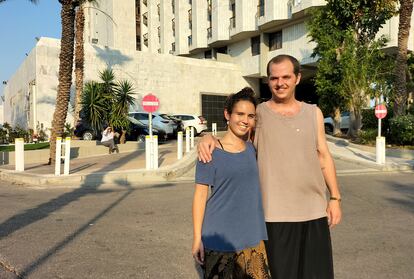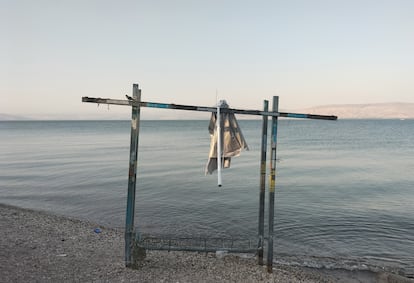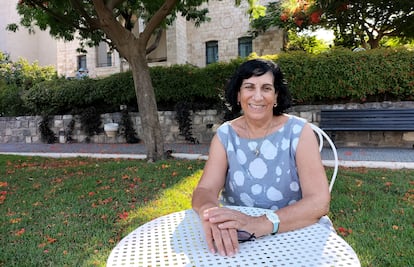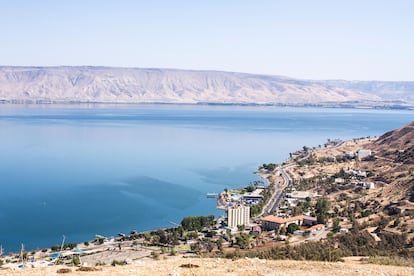Israelis who fled Hezbollah’s rockets eight months ago find themselves back under air raid sirens
Missiles fired by the Lebanese fundamentalist militia reached Tiberias, 25 miles from the border, where 12,000 evacuees are being put up in hotels. The displaced see only one option: open war

Last year, Yamit Bar had spent months planning a long tour of Southeast Asia, a popular destination for Israelis like herself. She was due to set off in mid-October. A week earlier, Hamas launched its surprise attack, Israel began shelling Gaza, and the Hezbollah militia joined the fray with — at the time probing and measured — shelling that set alarm bells ringing in her kibbutz, Baram, located barely 300 meters from the Lebanese border. Israel had just discovered that its defenses were not impregnable and did not know how many Gazan militiamen may still be roaming its territory, so 450 of the 500 inhabitants of the kibbutz decided to relocate some 40 kilometers (25 miles) further south, to Tiberias, a city on the shores of the Sea of Galilee whose numerous hotels — normally full of domestic tourists — now play host to 12,000 evacuees from the border area. Israeli Prime Minister Benjamin Netanyahu announced a “long and difficult” war that eight months later and with no end in sight has resulted in the deaths of over 37,000 Palestinians, a genocide case at the International Court of Justice in The Hague, and 64,000 Israelis and 94,000 Lebanese evacuated from their homes. Bar, 25, could not have imagined that scenario then. She hesitated over whether to remain in her country, but stuck to her original plan.
On June 11, she landed back in Israel, still wearing baggy pants from her travels. The last thing she expected was a welcome in the form of an anti-aircraft air raid siren, the first in Tiberias in eight months of crossfire between Israeli forces and Hezbollah militiamen in the border area. “It was a shock to come back and hear the sirens here, to see how the situation has only deteriorated over time. How it’s not getting better. When I left, I was sure I would be back home by now,” she says in front of the hotel where she has joined the displaced.

Standing next to her is Enosh Katz, a childhood friend from the kibbutz. Four years her junior, he is part of the local defense platoons that are the first responders on the ground until reinforcements arrive. As he remained in the area, he feels much more resentment, which he airs at every turn: against the Netanyahu government, for having “forgotten” and “sacrificed” the north while fueling the war in Gaza “for personal gain;” for the feeling that the Israel Defense Forces (IDF) would have invaded Lebanon by now if one-twentieth of the rockets that are fired daily in the north had fallen on Tel Aviv; and for not having seen the October 7 attacks coming. “Obviously, I blame Hamas, but the government has the blood of the victims on its hands,” he says.
Like the vast majority of evacuees from the north, Bar and Katz want open war with Hezbollah.
Roughly speaking, the escalation could lead to three scenarios. One is for Israel to end its invasion of Gaza and for Hezbollah — as it has been saying it will do for months — to cease its attacks. But Katz believes that would not be enough. “It would be like postponing the war for a couple of years,” he argues. The other is to seal a political agreement through mediators — first negotiated by France and now, above all, by the United States — to truly implement United Nations Resolution 1701, which brought an end to the 2006 war between Israel and Hezbollah. That is, to move the militia north of the Litani River, to put an end to the daily Israeli violations of Lebanese airspace, and to open discussions over differences concerning the border. “There is already an agreement, and it’s called 1701. And look how it has been adhered to…” says Katz.
All that remains, he believes, is a war that will bring “a few years of peace,” like those that followed the 2006 conflict. It is a widespread opinion in Israel, where the future always appears tinged with blood, as if wars are inevitable and there is no alternative but to handle them every so many years. “Our kibbutz is closer to Beirut than to Tel Aviv,” he points out, before joking that we are all actually in the Lebanese capital. That’s where navigation systems such as Google Maps and Waze place us, even a dozen kilometers further south. The Israeli army is jamming the GPS signal to prevent Hezbollah shells from being guided.
Another displaced person, Orna Flusser, illustrates the same concept with her family. She is 65 years old and a few days ago she saw her five-year-old grandson. “It came to my mind where we will each be in 15 years. I will be 80 and won’t have the strength to leave my home; he will be a soldier fighting in the next war against Hezbollah,” she says in the dining room of another hotel in Tiberias, which houses some 60 displaced people from She’ar Yashuv, an agricultural cooperative 3,000 meters from the Lebanese border.
Smiling, in bathing robes, flip-flops and sunglasses, Israeli tourists attracted by the hotel’s spa, which reopened a few weeks ago, pass by and Flusser laughs at the dissonance. “We always say that people come to this hotel to rest and we’ll return home to rest. Nobody can stand eight months in a hotel.” Even a boutique one and prohibitively expensive for some budgets. At the reception desk, a sign in Hebrew still announces the pre-war price per double room — from 1,280 shekels ($345) a night — a fee that evacuees do not have to pay.

It is a beautiful 19th-century building that still belongs to the Church of Scotland. A group of missionaries founded it as a hospital for the local population, at that time a mix of Jews and Arabs. “I know,” she replies, “but for me it’s a gilded cage. I have 25 square meters of room and a bed twice as big as the one at home. The problem is not the conditions. I have nothing to complain about there. The problem is that it’s not my home. And I want to go back to my home, with my kitchen, where I can cook whatever I want whenever I want. I’ve been here for eight months with the permanent feeling of being a guest.”
Flusser confesses that she didn’t even go to the bomb shelter when the unprecedented alarm sounded in Tiberias. “I’ve been living for years with the idea that whatever has to kill me will kill me, whether it’s a Hezbollah rocket or a truck on the road,” she says. She also returns to She’ar Yashuv on weekends, despite its proximity to Lebanon. She doesn’t bother using the safe room there either. “I only did it the day Iran attacked. That was a new experience for everyone.” Flusser’s main argument is that it doesn’t matter where the air raid alarms are sounding, because “sooner or later, they’re going to end up ringing all over the country.” “Whoever believes that today [June 12] is going to be the end of the story is in denial,” she adds.

On June 11, the Israeli army assassinated Taleb Abdala, the highest-ranking Hezbollah commander killed in the eight months of fighting, in southern Lebanon. The Shiite militia retaliated a day later with its largest wave of shells: 215, setting off alarms in various places, including — for the first time since October, aside from an earlier false alarm — Tiberias. It was the biggest escalation between Israel and the fundamentalist group since the war in Gaza began, during which time skirmishes on the sidelines of the Israeli invasion of the Strip have evolved into low-intensity warfare. The Lebanese militia has also promised stronger and more frequent attacks.
“The most difficult thing for all of us is the lack of a horizon. And the big disappointment that nothing is happening. It’s like a game of ping-pong, but nothing happens.”
— By “nothing happening” do you mean open warfare?
— Yes, I do.
— And you don’t see any other option?
— Look, I’m not a politician. I don’t even know exactly what I want. I just want the sense of security of knowing that Hezbollah can’t be at my doorstep in five minutes.
Sign up for our weekly newsletter to get more English-language news coverage from EL PAÍS USA Edition
Tu suscripción se está usando en otro dispositivo
¿Quieres añadir otro usuario a tu suscripción?
Si continúas leyendo en este dispositivo, no se podrá leer en el otro.
FlechaTu suscripción se está usando en otro dispositivo y solo puedes acceder a EL PAÍS desde un dispositivo a la vez.
Si quieres compartir tu cuenta, cambia tu suscripción a la modalidad Premium, así podrás añadir otro usuario. Cada uno accederá con su propia cuenta de email, lo que os permitirá personalizar vuestra experiencia en EL PAÍS.
¿Tienes una suscripción de empresa? Accede aquí para contratar más cuentas.
En el caso de no saber quién está usando tu cuenta, te recomendamos cambiar tu contraseña aquí.
Si decides continuar compartiendo tu cuenta, este mensaje se mostrará en tu dispositivo y en el de la otra persona que está usando tu cuenta de forma indefinida, afectando a tu experiencia de lectura. Puedes consultar aquí los términos y condiciones de la suscripción digital.









































